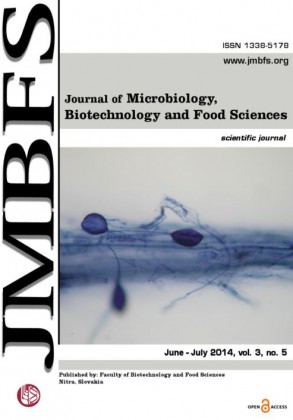MICROBIAL CONSORTIA FORMULATION FOR THE EFFECTIVE BIODEGRADATION OF BENZENE, TOLUENE, XYLENE AND PHENOL
Keywords:
Biodegradation, Fourier transform infrared spectroscopy, Microbial consortium, Mineral Salt mediaAbstract
Monoaromatic hydrocarbons such as benzene, toluene, xylene and phenol (BTXP) represent an important class of environmental contaminants because of their recognized toxicity to different organisms. Development of microbial consortia was attempted for the biodegradation of the mixture of these compounds. Alcaligenes sp d2, a phenol degrading microorganism reported earlier, was found to degrade all the compounds individually and also as a mixture. Three more novel bacterial isolates, Enterobacter aerogenes, Raoultella sp and Bacillus megaterium, were selected by soil enrichment technique and identified by 16S rDNA analysis. Phylogenetic analysis was performed in Molecular Evolutionary Genetics Analysis4 based on Unweighted Pair Group Method with Arithmetic mean to infer the phylogeny across the data. The isolates could grow in Mineral Salt media supplemented individually with a maximum concentration of 1.36 mM Benzene, 1.09 mM Toluene, 0.923 mM Xylene and 1.22 mM Phenol as the sole carbon source. Degradation studies were conducted in 100 ml Mineral Salt media containing the mixture of all the four compounds. The ether extracted cell-free medium was analyzed using Fourier transform infrared spectroscopy. The primary formulation of the microbial consortia for the degradation of the mixture of BTXP was done using the Fourier transform infrared spectroscopy data. This is the first report on the biodegradation potential of Bacillus megaterium SBS3on both phenol and benzene. Hence this strain can be considered as a novel isolate with immense degradation potential. The consortium of Alcaligenes sp d2, Enterobacter aerogenes, Bacillus megaterium, and Raoultella sp formulated through this attempt could effectively degrade the mixture of BTXP and application of this consortium can result in the development of strategies for the bioremediation of Benzene, Toluene, Xylene and Phenol.Downloads
Download data is not yet available.
Downloads
Published
2014-06-01
How to Cite
Vijayan, D., Kochupurackal, J., Abraham, A., & Chandrasekharan Nair, I. (2014). MICROBIAL CONSORTIA FORMULATION FOR THE EFFECTIVE BIODEGRADATION OF BENZENE, TOLUENE, XYLENE AND PHENOL. Journal of Microbiology, Biotechnology and Food Sciences, 3(6), 457–462. Retrieved from https://office2.jmbfs.org/index.php/JMBFS/article/view/7657
Issue
Section
Microbiology
License
Copyright (c) 2014 Dhanya Vijayan, Jayachandran Kochupurackal, Amith Abraham, Indu Chandrasekharan Nair

This work is licensed under a Creative Commons Attribution 4.0 International License.
All papers published in the Journal of Microbiology, Biotechnology and Food Sciences are published under a CC-BY licence (CC-BY 4.0). Published materials can be shared (copy and redistribute the material in any medium or format) and adapted (remix, transform, and build upon the material for any purpose, even commercially) with specifying the author(s).

